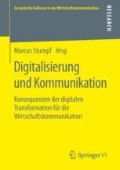Zusammenfassung
An der TU Dresden startete im Herbst 2016 ein Forschungsprojekt zur Entwicklung eines digitalen Assistenzsystems (‚Smarte Werkbank’), gefördert durch den Europäischen Sozialfonds und die Sächsische Aufbaubank. Ziel des Projektes ist es, ein System zu entwickeln, das – insbesondere auch unter Nutzung der neuen Möglichkeiten, die die Digitalisierung heute und zukünftig bietet – den Entwicklungsprozess produktionstechnischer Systeme unterstützt. Zur Lösung dieser Aufgabe wurde ein interdisziplinäres Projektteam gebildet, bestehend aus sechs Forschungs- und sechs Praxispartnern
Access this chapter
Tax calculation will be finalised at checkout
Purchases are for personal use only
Preview
Unable to display preview. Download preview PDF.
Literaturverzeichnis
Bark, Rosalind H./Kragt, Marit E./Robson, Barbara J. (2016): Evaluating an Interdisciplinary Research Project. Lessons Learned for Organisations, Researchers and Funders. In: International Journal of Project Management 34. 8. 1449-1459.
Belz, Christian (2013): Stark im Vertrieb. Stuttgart: Schäffer-Poeschel.
Belz, Christian/Backhaus, Klaus/Lilien, Gary (2013): Trends im Industriegütermarketing. Fortschritte, Entwicklungen und zukünftiger Forschungsbedarf. In: Marketing Review St. Gallen 30. 4. 10-25.
Benda, Lee E./Poff, Leeroy N./Tague, Christina/Palmer, Margaret A./Pizzuto, James/Cooper, Scott/Stanley, Emily/Moglen, Glenn (2002): How to Avoid Train Wrecks When Using Science in Environmental Problem Solving. In: BioScience 52. 12. 1127-1136.
Boehm, Andreas/Mengel, Andreas/Muhr, Thomas (Hrsg.) (1994): Konzepte, Methoden, Werkzeuge. Konstanz: UVK Universitätsverlag Konstanz.
Borcherding, Holger (2013): Der mittelständische Maschinenbau. Flexibel und höchst innovativ auch in der Systementwicklung. In: Sendler (2013): 55-72.
Cooley, Elizabeth (1994): Training an Interdisciplinary Team in Communication and Decision-Making Skills. In: Small Group Research 25. 1. 5-25.
Edmondson, Amy C./Nembhard, Ingrid M. (2009): Product Development and Learning in Project Teams. The Challenges Are the Benefits. In: Journal of Product Innovation Management 26. 2. 123-138.
Emmitt, Stephen (2010): Managing Interdisciplinary Projects. A Primer for Architecture, Engineering and Construction. London: Routledge.
Fiaschetti, Andrea/Pietrabissa, Antonio/Delli Priscoli, Francesco (2015): Towards Manufacturing 2.0: An Innovative Architecture for the Factory of the Future. In: Networks and Communications (EuCNC), European Conference on IEEE, 450-454.
Franke, Nikolaus/Piller, Frank T. (2003): Key Research Issues in User Interaction with User Toolkits in a Mass Customisation System. In: International Journal of Technology Management 26. 578-599.
Franke, Nikolaus/von Hippel, Eric (2013): Satisfying Heterogeneous User Needs via Innovation Toolkits. The Case of Apache Security Software. In: Research Policy 32. 1119-1216.
Frey, Carl B./Osborne, Michael A. (2017): The Future of Employment: How Susceptible Are Jobs to Computerisation?, In: Technological Forecasting and Social Change 114. 254-280.
Gardner, Heidi K./Gino, Francesca/Staats, Bradley R. (2012): Dynamically Integrating Knowledge in Teams. Transforming Resources into Performance. In: Academy of Management Journal 55. 4. 998-1022.
Gorecky, Dominic/Schmitt, Mathias/Loskyll, Matthias (2017): Mensch-Maschine-Interaktion im Industrie 4.0-Zeitalter. In: Vogel-Heuser et al. (2017): 217-234.
Jeschke, Sabina/Isenhardt, Ingrid/Hees, Frank/Henning, Klaus (Hrsg.) (2016): Automation, Communication and Cybernetics in Science and Engineering 2015/2016. Wiesbaden: Springer.
Klein, Julie Thompson (1996): Crossing Boundaries. Knowledge, Disciplinarities and Interdisciplinarities. Charlottesville: University Press of Virginia.
Kleinsmann, Maaike/Buijs, Jan/Valkenburg, Rianne (2010): Understanding the Complexity of Knowledge Integration in Collaborative New Product Development Teams. A Case Study. In: Journal of Engineering and Technology Management 27. 1. 20-32.
Lasi, Heiner/Fettke, Peter/Kemper, Hans-Georg/Feld, Thomas/Hoffmann, Michael (2014): Industry 4.0. In: Business & Information Systems Engineering 6. 4. 239-242.
Marzano, Mariella/Carss, David N./Bell, Sandra (2006): Working to Make Interdisciplinarity Work: Investing in Communication and Interpersonal Relationships. In: Journal of Agricultural Economics 57. 2. 185-197.
Mayring, Philipp (2002): Einführung in die Qualitative Sozialforschung. 5. Auflage. Weinheim/Basel: Beltz Verlag.
Mayring, Philipp (1994): Qualitative Inhaltsanalyse. In: Boehm et al. (1994): 159-175.
Mayring, Philipp (2015): Qualitative Inhaltsanalyse. Grundlagen und Techniken. 12. Auflage. Weinheim/Basel: Beltz Verlag.
Menon, Ajay/Chowdhury, Jhinuk/Lukas, Bryan A (2002): Antecedents and Outcomes of New Product Development Speed: An Interdisciplinary Conceptual Framework. In: Industrial Marketing Management 31. 4. 317-328.
Niggemann, Oliver/Windmann, Stefan (2013): Intelligente Assistenzsysteme für die Automation: Menschen bei der Prozessführung besser unterstützen. München: DIV Dt. Industrieverlag.
Piller, Frank T./Hilgers, Dennis (Hrsg.) (2013): Praxishandbuch Technologietransfer. Innovative Methoden zum Transfer wissenschaftlicher Ergebnisse in die industrielle Anwendung. Düsseldorf: Symposion Publishing.
Piller, Frank T./Hilgers, Dennis (2013): Technologietransfer. Bedeutung und Herausforderungen. In: Piller/Hilgers (2013): 17-37.
Schuster, Katharina/Groß, Kerstin/Vossen, René/Richert, Anja/Jeschke, Sabina (2016): Preparing for Industry 4.0 – Collaborative, Virtual Learning Environments in Engineering Education. In: Jeschke et al. (2016): 417-427.
Senderek, Roman/Geisler, Katrin (2015): Assistenzsysteme zur Lernunterstützung in der Industrie 4.0. In: Proceedings des Pre-Conference Workshops der 13. E-Learning Fachtagung. 36-46.
Sendler, Ulrich (Hrsg.) (2013): Industrie 4.0. Berlin et al.: Springer.
Siems, Florian/Papen, Marie-Christin/Hütten, Antje S. J./Niemand, Thomas/Walcher, Dominik/ Antons, David/Bürgermeister, Lisa/Feher, Katalin/Pich, Andrij/Vogt, Felix (2014): Managing Relationships in Interdisciplinary Research Projects. The HoQ Experience. In: Conference Proceedings of the 13th International Science-to-Business Marketing Conference on Cross Organizational Value Creation. 202-211.
Stokols, Daniel/Misra, Shalini/Moser, Richard P./Hall, Kara L./Taylor, Brandie K. (2008): The Ecology of Team Science. Understanding Contextual Influences on Transdisciplinary Collaboration. In: American Journal of Preventive Medicine 35. 2. 95-115.
Thompson, Jessica Leigh (2009): Building Collective Communication Competence in Interdisciplinary Research Teams. In: Journal of Applied Communication Research 37. 3. 278-297.
Vogel-Heuser, Birgit/Bauernhansl, Thomas/Hompel, Michael (Hrsg.) (2017): Handbuch Industrie 4.0 Bd. 4. 2. Auflage. Berlin: Springer.
Wiek, Ulrich (2015): Zusammenarbeit fördern. Kooperation im Team. Ein praxisorientierter Überblick für Führungskräfte. Berlin: Springer.
Wuchty, Stefan/Jones, Benjamin F./Uzzi, Brian (2007): The Increasing Dominance of Teams in Production of Knowledge. In: Science 316. 5827. 1036-1039.
Author information
Authors and Affiliations
Corresponding author
Editor information
Editors and Affiliations
Rights and permissions
Copyright information
© 2019 Springer Fachmedien Wiesbaden GmbH, ein Teil von Springer Nature
About this chapter
Cite this chapter
Schönitz, MS. et al. (2019). Potenziale digitaler Assistenzsysteme für die Kommunikation in interdisziplinären Entwicklungsprojekten. In: Stumpf, M. (eds) Digitalisierung und Kommunikation . Europäische Kulturen in der Wirtschaftskommunikation, vol 31. Springer VS, Wiesbaden. https://doi.org/10.1007/978-3-658-26113-9_22
Download citation
DOI: https://doi.org/10.1007/978-3-658-26113-9_22
Published:
Publisher Name: Springer VS, Wiesbaden
Print ISBN: 978-3-658-26112-2
Online ISBN: 978-3-658-26113-9
eBook Packages: Social Science and Law (German Language)

